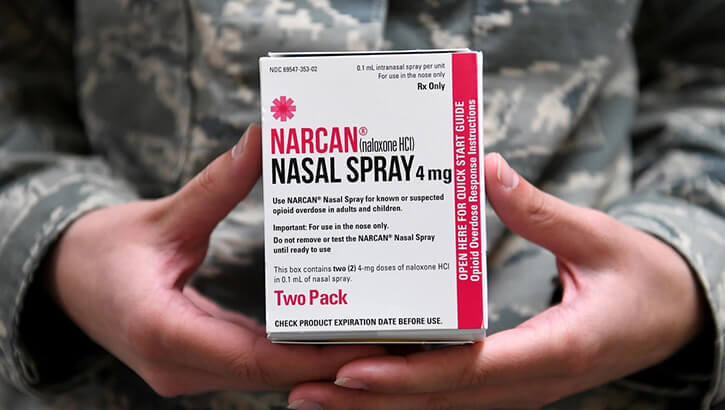NATIONAL HARBOR, Md.—Troops and their families can now purchase Narcan from their local exchange as the military grapples with the effects of the national opioid epidemic.
Making Narcan, the naloxone nasal spray that can reverse an opioid overdose within minutes, more widely available to the military community through Army and Air Force Exchange Service stores may curb drug-related deaths among service members and their loved ones.
“If you look at where our bases are, there’s a very definite Venn diagram over areas that are being affected, unfortunately, by this epidemic,” Lt. Col. Sharon Arana said at AFA’s Air, Space and Cyber Conference here Sept. 17. “The intent was to remove a barrier to access for this critical medication for our families.”
Arana leads Air Combat Command’s Sword Athena team, one of a network of Airman-led groups that spearhead changes to policies that affect the readiness of Airmen and their families.
The change was spurred by a Sword Athena event at Joint Base Langley-Eustis, Va., in February that brought together command staff and military families to discuss issues that may have fallen under the Air Force’s radar. The event raised problems with access to Narcan, prompting Sword Athena to reach out to AAFES to make the spray more easily accessible, Arana said.
Narcan is now available in AAFES stores and online. A two-pack of Narcan, which doesn’t require training to administer, currently costs $44.99 on the exchange website. The store also offers pouches to carry the antidote on the go.
Last year, the Defense Department reported more than 300 fatal overdoses among Active-Duty service members between 2017 and 2021, and nearly 15,000 non-fatal overdoses from 2017 to February 2023, when the Pentagon responded to an inquiry from Sen. Ed Markey (D-Mass.). About 175 of those fatal overdoses involved fentanyl, a potent synthetic opioid.
About 81,800 people died of opioid-involved overdoses in the United States in 2022, according to federal data.
The 2024 National Defense Authorization Act mandated that by Jan. 1, 2025, the Pentagon must issue regulations to ensure the antidote is available on all military installations and each operational environment, as well as to track the naloxone that is distributed.
The department must also track the illegal use of fentanyl and other controlled substances across the military. Congressional lawmakers called for a briefing on the progress of efforts to curb substance abuse no later than June 1, 2025.
